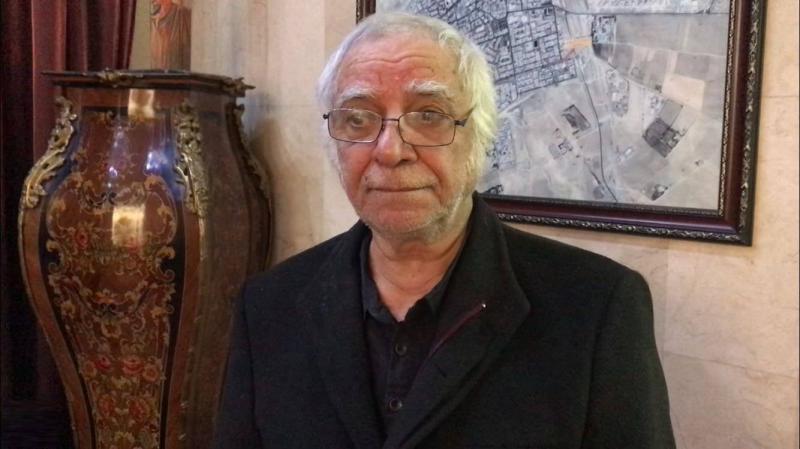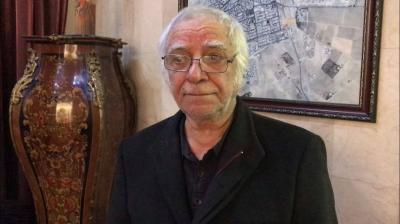Iraqi composer Kaukab Hamza passed away in a hospital in Denmark after suffering from illness at the age of 80, leaving behind a long artistic career, which we will discuss in this report. The Iraqi Artists Association mourned the artist Kaukab Hamza through a statement, expressing: "With deep sadness and sorrow, the Iraqi Artists Association mourns the passing of the great composer Kaukab Hamza, asking the Almighty to embrace him with His vast mercy and to grant his family, friends, and colleagues patience and solace. To Him we belong and to Him we shall return." Hamza experienced a "sudden" health crisis on Monday, after which he was hospitalized until his passing.
Who is Iraqi Composer Kaukab Hamza? Kaukab Hamza was born in 1944 in the Qaasim district of Babil province in Iraq to a Kurdish family. He studied at the Institute of Fine Arts in Baghdad and completed his education at the Institute of Music Studies. He began his professional career as a teacher at Al-Murabed School in Basra Province. Due to his graduation from a music institute, his colleagues insisted he take up composing.
Hamza became a composer in Iraq in the 1960s, aligning with a movement of modern Iraqi music that introduced new elements in musical structure and expressive horizons in melodies, featuring new voices that deviated from the traditional song formats. This new wave was led by a group of young composers, of whom Kaukab Hamza was one of the most prominent, with his first composition being a piece titled "Amaal."
Hamza was an opponent of the regime at the time and is considered one of the symbols of the Iraqi national movement. He was a professor at the University of Basra, receiving poetry from the Ba'ath Party for composition, which he refused. The Iraqi regime banned the dissemination of his songs, and possession of them was considered a punishable crime, but they continued to circulate in private gatherings.
He was forced to flee Iraq on July 21, 1974, heading to Czechoslovakia and later to the Soviet Union, where he studied music in Azerbaijan and moved between Kurdistan, Syria, and America, eventually settling in Denmark in 1989. In exile, he released a musical piece entitled "Goodbye Babylon" in 1992, followed by another song titled "Locusts Invade Babylon."
After staying in Europe, he decided to move to Morocco to study music, where he met Fatima Al-Qaryani, who performed some of his songs, as well as Asma Monwar, whom he admired. Critics referred to composer Kaukab Hamza as the "Star Maker," as he discovered some of the best Iraqi voices, including Hussein Nimah, Riyadh Ahmad, Satar Jabbar, Saadoun Jaber, and Ali Rashid. He also discovered the Moroccan singer Asma Monwar, being the first to present her to the public when he composed the song "Tears of Isis" in 1997. The song, written by Egyptian poet Ahmed Fouad Negm, debuted in Cairo during the celebration of the poet's seventieth birthday.
He composed for many Iraqi and Arab artists such as Maida Nuzhat, Saadoun Jaber, Hussein Nimah, Satar Jabbar, Fadel Awad, Karim Mansour, Fouad Salem, and the Kuwaiti singer Abdullah Ruwaished, among many others. He also composed many famous songs like "Ya Najma," "Al-Qantra Ba'eeda," and "Ya Toyour Al-Tayira," performed by the esteemed singer Saadoun Jaber.
He has numerous compositions for television series and cinema. Hamza returned to Iraq after the fall of Saddam Hussein’s regime and is considered one of the symbols of Iraqi culture and one of the most prominent Iraqi and Arab composers. Kaukab excelled in the field of musical portrayal, granting songs a visual representation akin to a painting, as seen in the songs "Hasoda" by Maida Nuzhat and "Al-Qantra" by Saadoun Jaber, among others.
It is noteworthy that his compositions have become an important part of the collective memory and sentiment of the Iraqi people, and many of them have left a significant impact on the taste of Iraqi and Arab listeners.




